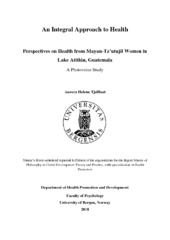| dc.description.abstract | Background: Health is a complex issue and can be approached from varying perspectives, from a technology-driven biomedical approach to a more intricate understanding of health as a result of social surroundings. In Guatemala, indigenous groups are experiencing poor health compared to that of non-indigenous people. In a world of continually shifting values and worldviews, it is essential to listen to indigenous women and their voices. Indigenous peoples’ perspectives are often neglected, and therefore we lack a holistic understanding of the globalised world. Research objective: The overall objective of this study was to explore how indigenous Tz’utujil women define health and what enables them to experience good health. The Integral theory has been utilised to conceptualise and explore their perspectives. Research methods: In order to foster the participants’ engagement, the study has employed the participatory research method “Photovoice”, combined with individual interviews. Findings: This study found that the Tz’utujil are adapting to changes brought by postcolonialism and globalisation, while at the same time being responsible for their family’s health. They experience health through a range of influences, such as being in nature, spending time with family, and gaining new knowledge from institutions like Vision Guatemala. Their definitions of health can be presented through the four dimensions of the Integral theory. Conclusion: Complementary perspectives, such as those from the participants that are influenced by their values, beliefs, practices and behaviours, community beliefs, and social interactions and perspectives from the support from health service systems, must be comprehensively considered in order to get a holistic understanding of health. By exploring the different connections between these components, we develop a more complete picture of health and consequently we better understand how health promotion must precede. | en_US |
